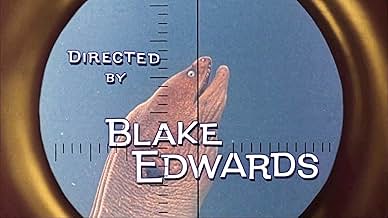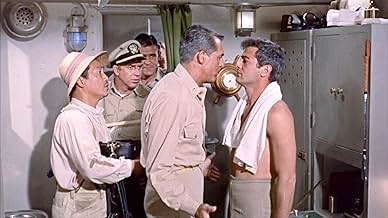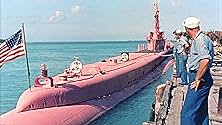During World War II, a commander finds himself stuck with a decrepit (and pink) submarine, a con man executive officer, and a group of army nurses.During World War II, a commander finds himself stuck with a decrepit (and pink) submarine, a con man executive officer, and a group of army nurses.During World War II, a commander finds himself stuck with a decrepit (and pink) submarine, a con man executive officer, and a group of army nurses.
- Nominated for 1 Oscar
- 1 win & 5 nominations total
Dick Sargent
- Ens. Stovall
- (as Richard Sargent)
Clarence Lung
- Sgt. Ramon Gillardo
- (as Clarence E. Lung)
Featured reviews
Directed by Blake Edwards (well-known for the "Pink Panther" series, Breakfast at Tiffany's, The Great Race, "10", Victor/Victoria, and many others), this is an expertly-executed comedy with plenty of visual humor as well a "boat-load" of dry wisecracks and suggestive innuendo for the veteran cast to exploit, seemingly presaging the early 1960's sex comedies. Apparently inspired by the real-life adventures of the American submarines SEALION, SEADRAGON, and SPEARFISH, as well as humorous anecdotes adopted from other submarines, and technically advised by retired wartime submarine commander Rear Admiral Lucius M. Chappel, in a "funny" and sometimes subtle way it may be the most realistic movie about US submarines in World War II ever made.
Plot outline: immediately following Pearl Harbor the Japanese prepare to invade the American-occupied Philippine Islands, and during an air raid on the Cavite naval base there, sink the almost brand-new submarine SEA TIGER. Nevertheless, her aggressive and professional yet equally human commander, Matt Sherman - played with admirable credibility by Cary Grant - is not about to take this lying down. After persuading the squadron commodore to give him the go-ahead, he and the remnants of his ship's company - diminished due to transfers made because of the boat's sunken condition - succeed in raising her from the harbor bottom and commence getting her seaworthy enough to escape to Australia before the pending Japanese assault. Unfortunately their repair efforts, already daunting enough, are impossibly impeded by an apparently bureaucratically-based shortage of crucial spare parts and supplies - even toilet paper (a gag in the film rendered nearly verbatim from the true-life experience of the submarine SKIPJACK).
At this point Tony Curtis enters as Lt. Nick Holden (the character's name calling to mind actor William Holden's patented self-indulgent bad-boy persona). Having grown up in a neighborhood called "Noah's Ark" ("you traveled in pairs or you just didn't travel"), our Lt. Holden is an accomplished back-alley maneuverer who joined the Navy for the prestige of the uniform and what it can get him (in particular, a certain Miss "Super Chief"). Alas, having secured for himself a cushy job as an admiral's aid sent ahead to Manila to prepare for his admiral's later arrival, the sudden outbreak of the war results in the cancellation of the admiral's transfer and all Mr. Holden's carefully manipulated plans are sent completely awry. Thus being at loose ends he finds himself assigned as a replacement officer to the SEA TIGER. Faced with the alternative of being stuck on Bataan to endure the oncoming Japanese conquest, he sees it is in his best interest to make up for the seagoing experience he has managed to avoid up to this point in his naval career by becoming the boat's Supply Officer and securing everything the captain needs to get "the . . . submarine" out of there and to someplace where he can get a better deal.
Although thoroughly uncomfortable with this new addition to the wardroom of his ship, Captain Sherman is so solidly dedicated to his responsibilities as the boat's commander that he is willing to make "a pact with the Devil" to get her going again and so Lt. Holden, allied with his handpicked detail of "scavengers" - Seaman Hunkle (Gavin McLeod), a sailor only known as "The Prophet {of Doom}," and of course the trusty (or at least reliable and punctilious) marine Sergeant Ramon Gallardo ("there isn't a burglar, swindler, pickpocket, or fence in the islands that doesn't know, love, and respect him") - commences a supply procurement program which might most charitably be characterized as unorthodox - or less charitably as just plain felonious. But he really hits his high point when he manages to "scavenge" five stranded Army nurses and convince the captain that he has to take them aboard. From then on the film becomes Cary Grant's battle to get his groaning, belching, backfiring, spit-and-bailing-wire-patched submarine safely to Australia while avoiding any "exchange of information" concerning "the facts of life" between the crew and their guests.
His struggle is complicated all the more by his continual personal encounters with the almost terminally accident-prone but especially well-endowed young nurse Dolores Crandall (in the words of the "Chief of the Boat," Malumphry - "if you wanna know what you're fightin' for - there's your answer") who for all her blunders unintentionally winds up saving the boat and all aboard. As if to highlight the unconventionality of their situation along the way they manage to wind up with the vessel painted pink (don't ask me how - just try to believe I actually saw a performance nearly identical to Malumphry's in reaction to a similar problem aboard a real-life nuclear ballistic missile submarine around 1980), have to set up a maternity ward, complete with goat ("the children will need fresh milk"), and accomplish the unique induction of "Seaman Hornsby" into his brief but flavorful naval career. The plot is actually developed in the form of a flashback from about 1960 allowing it to end with a slightly sentimental and amusing bit of a twist. Clean and wholesome while still being thoroughly adult ("when a man is tired and irritable you can be sure there's one thing he's not getting enough of -- vitamins and minerals"), you can watch this one with your kids - maybe even after they've reached their cynical adolescent years.
Note: the use of the brackets {} above in place of the stylistically correct square brackets was made necessary by some IMDb format change that made use of the correct brackets impossible. Hopefully they will not eliminate other commonly used symbols in future updates simply because the people they employ never got better than a "C" in junior high school English class and don't know what they are for.
Plot outline: immediately following Pearl Harbor the Japanese prepare to invade the American-occupied Philippine Islands, and during an air raid on the Cavite naval base there, sink the almost brand-new submarine SEA TIGER. Nevertheless, her aggressive and professional yet equally human commander, Matt Sherman - played with admirable credibility by Cary Grant - is not about to take this lying down. After persuading the squadron commodore to give him the go-ahead, he and the remnants of his ship's company - diminished due to transfers made because of the boat's sunken condition - succeed in raising her from the harbor bottom and commence getting her seaworthy enough to escape to Australia before the pending Japanese assault. Unfortunately their repair efforts, already daunting enough, are impossibly impeded by an apparently bureaucratically-based shortage of crucial spare parts and supplies - even toilet paper (a gag in the film rendered nearly verbatim from the true-life experience of the submarine SKIPJACK).
At this point Tony Curtis enters as Lt. Nick Holden (the character's name calling to mind actor William Holden's patented self-indulgent bad-boy persona). Having grown up in a neighborhood called "Noah's Ark" ("you traveled in pairs or you just didn't travel"), our Lt. Holden is an accomplished back-alley maneuverer who joined the Navy for the prestige of the uniform and what it can get him (in particular, a certain Miss "Super Chief"). Alas, having secured for himself a cushy job as an admiral's aid sent ahead to Manila to prepare for his admiral's later arrival, the sudden outbreak of the war results in the cancellation of the admiral's transfer and all Mr. Holden's carefully manipulated plans are sent completely awry. Thus being at loose ends he finds himself assigned as a replacement officer to the SEA TIGER. Faced with the alternative of being stuck on Bataan to endure the oncoming Japanese conquest, he sees it is in his best interest to make up for the seagoing experience he has managed to avoid up to this point in his naval career by becoming the boat's Supply Officer and securing everything the captain needs to get "the . . . submarine" out of there and to someplace where he can get a better deal.
Although thoroughly uncomfortable with this new addition to the wardroom of his ship, Captain Sherman is so solidly dedicated to his responsibilities as the boat's commander that he is willing to make "a pact with the Devil" to get her going again and so Lt. Holden, allied with his handpicked detail of "scavengers" - Seaman Hunkle (Gavin McLeod), a sailor only known as "The Prophet {of Doom}," and of course the trusty (or at least reliable and punctilious) marine Sergeant Ramon Gallardo ("there isn't a burglar, swindler, pickpocket, or fence in the islands that doesn't know, love, and respect him") - commences a supply procurement program which might most charitably be characterized as unorthodox - or less charitably as just plain felonious. But he really hits his high point when he manages to "scavenge" five stranded Army nurses and convince the captain that he has to take them aboard. From then on the film becomes Cary Grant's battle to get his groaning, belching, backfiring, spit-and-bailing-wire-patched submarine safely to Australia while avoiding any "exchange of information" concerning "the facts of life" between the crew and their guests.
His struggle is complicated all the more by his continual personal encounters with the almost terminally accident-prone but especially well-endowed young nurse Dolores Crandall (in the words of the "Chief of the Boat," Malumphry - "if you wanna know what you're fightin' for - there's your answer") who for all her blunders unintentionally winds up saving the boat and all aboard. As if to highlight the unconventionality of their situation along the way they manage to wind up with the vessel painted pink (don't ask me how - just try to believe I actually saw a performance nearly identical to Malumphry's in reaction to a similar problem aboard a real-life nuclear ballistic missile submarine around 1980), have to set up a maternity ward, complete with goat ("the children will need fresh milk"), and accomplish the unique induction of "Seaman Hornsby" into his brief but flavorful naval career. The plot is actually developed in the form of a flashback from about 1960 allowing it to end with a slightly sentimental and amusing bit of a twist. Clean and wholesome while still being thoroughly adult ("when a man is tired and irritable you can be sure there's one thing he's not getting enough of -- vitamins and minerals"), you can watch this one with your kids - maybe even after they've reached their cynical adolescent years.
Note: the use of the brackets {} above in place of the stylistically correct square brackets was made necessary by some IMDb format change that made use of the correct brackets impossible. Hopefully they will not eliminate other commonly used symbols in future updates simply because the people they employ never got better than a "C" in junior high school English class and don't know what they are for.
A wry and lighthearted look at the U.S. Navy in 1941. Cary Grant and Tony Curtis shine amongst a wonderful supporting cast in this fictional story inspired by an actual incident that occurred during WWII. So many war movies are depressing, while others are completely ridiculous. This film, while full of sexual innuendo and lighthearted humor, still manages to keep it's humanity, with one foot planted firmly in the reality of the Pacific theater.
A jaunty tale of an injured sub, a few army nurses, a group of lonely sailors, and some pink paint. The direction is above par for the time period and genre, the writing is bright and witty, even for today's standards, and the performances are thoroughly entertaining.
This is a recommended must-see for fans of Curtis and Grant. Grab the popcorn and soda and enjoy! I give this charming 1959 classic a 7 out of 10.
A jaunty tale of an injured sub, a few army nurses, a group of lonely sailors, and some pink paint. The direction is above par for the time period and genre, the writing is bright and witty, even for today's standards, and the performances are thoroughly entertaining.
This is a recommended must-see for fans of Curtis and Grant. Grab the popcorn and soda and enjoy! I give this charming 1959 classic a 7 out of 10.
In Tony Curtis's filmed tribute to Cary Grant for TCM he made much of his well known idolatry of the man who made him want to become an actor. As a kid growing up in the mean streets of New York, young Bernie Schwartz saw in Cary Grant all he ever wanted to be up there on the silver screen.
During naval service on board a submarine in World War II he got to see Cary Grant in Warner Brothers Destination Tokyo. As Curtis said, life has a funny way of working things out. What happens; Tony Curtis gets to star with Grant years later in a World War II service comedy that is set aboard a submarine.
Destination Tokyo was not one of Grant's best films, but Operation Petticoat definitely is. Right after World War II starts, Grant's new ship, the Tigerfish is sunk right in her berth in a remote Pacific Island. Grant persuades Admiral Robert Simon to make whatever repairs he can and try and get the ship back to Pearl Harbor for repairs.
Among other things Grant gets is a new officer Tony Curtis who hasn't exactly seen much sea duty, but he's quite the operator. The two develop quite an interesting relationship on the voyage.
And it's one thing after another on that memorable shakedown cruise back to Pearl Harbor. But Cary Grant is as unflappable and charming as ever, though even he seems a bit put out at times.
There are some pretty hilarious moments in Operation Petticoat, the sinking of a truck, the painting of the Tigerfish pink and then having to leave it that way until Pearl Harbor. And who can forget how they are saved from friendly fire at the climax of the film.
Operation Petticoat was one of the biggest commercial and critical hits that Cary Grant had in Hollywood. Coming right after North By Northwest it could well be argued this was the high point of his career.
The film holds up very well today, I think today's audience would laugh just as hard as they did in 1959.
During naval service on board a submarine in World War II he got to see Cary Grant in Warner Brothers Destination Tokyo. As Curtis said, life has a funny way of working things out. What happens; Tony Curtis gets to star with Grant years later in a World War II service comedy that is set aboard a submarine.
Destination Tokyo was not one of Grant's best films, but Operation Petticoat definitely is. Right after World War II starts, Grant's new ship, the Tigerfish is sunk right in her berth in a remote Pacific Island. Grant persuades Admiral Robert Simon to make whatever repairs he can and try and get the ship back to Pearl Harbor for repairs.
Among other things Grant gets is a new officer Tony Curtis who hasn't exactly seen much sea duty, but he's quite the operator. The two develop quite an interesting relationship on the voyage.
And it's one thing after another on that memorable shakedown cruise back to Pearl Harbor. But Cary Grant is as unflappable and charming as ever, though even he seems a bit put out at times.
There are some pretty hilarious moments in Operation Petticoat, the sinking of a truck, the painting of the Tigerfish pink and then having to leave it that way until Pearl Harbor. And who can forget how they are saved from friendly fire at the climax of the film.
Operation Petticoat was one of the biggest commercial and critical hits that Cary Grant had in Hollywood. Coming right after North By Northwest it could well be argued this was the high point of his career.
The film holds up very well today, I think today's audience would laugh just as hard as they did in 1959.
As long as you don't expect anything substantial, "Operation Petticoat" works quite well as light entertainment, thanks to a lively script with some pretty good material, two good leading performances by Tony Curtis and Cary Grant, and a solid supporting cast. While the whole story has very limited plausibility, it has its own internal logic and consistency, rather like the better of the more manic screwball comedies of an even earlier era.
The submarine setting is used creatively, and it has just enough realistic detail to keep it from getting too silly. Grant and Curtis have rather different styles, yet they work well together in setting the right tone for everything, and in involving the rest of the cast. While it would be hard to single out any of the other cast members, since none of them have a particularly large or important role, they all do well enough, and they make the secondary characters a solid part of the story.
There are plenty of amusing highlights, such as the pink paint and Curtis's scrounging expeditions. For all that it is just fluff, it fits together well, making for an entertaining, unpretentious movie.
The submarine setting is used creatively, and it has just enough realistic detail to keep it from getting too silly. Grant and Curtis have rather different styles, yet they work well together in setting the right tone for everything, and in involving the rest of the cast. While it would be hard to single out any of the other cast members, since none of them have a particularly large or important role, they all do well enough, and they make the secondary characters a solid part of the story.
There are plenty of amusing highlights, such as the pink paint and Curtis's scrounging expeditions. For all that it is just fluff, it fits together well, making for an entertaining, unpretentious movie.
There's really no reason to expect that this easy-going military comedy should hold up so well after almost 50 years. While extremely popular as a Christmas release in '59, it then boasted two top box office stars to bring in the crowds, which most critics agreed were the primary attraction supporting some rather thin and predictable material. But the merits are considerably more than reviewers originally gave credit for, and the film endures as a cleverly crafted entertainment on several levels. Its uncomplicated premise accommodates humor less derived from incident than from character and situation, making it seem far less pretentious than most films of its kind. Service comedies of this period tend to follow a pattern set by MR. ROBERTS, which was based on a hugely successful stage play and quite reverent to those origins. PETTICOAT is far more spontaneous, so even if plot threads tend to be a bit familiar, its the delivery rather than the content which holds our attention. Of course it doesn't hurt to have Cary Grant at the peak of his powers, hitting all the right notes, balancing the role of naval officer with innate dedication combined with his own charismatic charm and seemingly effortless humor, a performance which is both naturalistic and funny. Curtis, too, had found his groove at this point (he had just completed his tour de force for Billy Wilder, SOME LIKE IT HOT) contributing just the right balance of ingenuousness and star-of-the-month savvy to make his `second banana' role a success. But the lion's share of the credit must go to Blake Edwards, then in the early stages of his most successful period as a master comedy craftsman, boisterous yet sophisticated, among the last of a breed of Hollywood stylists on the rise at a time when the old studio system was nearing its end.
Did you know
- TriviaJeff Chandler was originally offered the role that went to Cary Grant, but chose to work on The Jayhawkers! (1959) instead. Grant himself was at first reluctant to take it, knowing he was much too old to play a wartime captain.
- GoofsAt the end of the movie, as then Admiral Sherman steps off the Sea Tiger, and he's greeted by his wife and two boys, the first lad says "Hi Mr. Grant".. but Grant picks up the pace like no errors had been made, and, of course you immediately have the bus pulling away with the car attached to it. Few people catch the boy calling him Mr. Grant--but it's there.
- Quotes
Lt. Cmdr. Matt T. Sherman: You see, when a girl is under 21, she's protected by law. When she's over 65, she's protected by nature. Anywhere in between, she's fair game! Look out!
- Crazy creditsOpening sequences as viewed through a periscope with cast and crew as various sea creatures.
- Alternate versionsOriginal German version was edited by ca. 22 minutes. Kinowelt DVD release incorporates ca. 5 minutes back into the film (all non-dialogue) and has the uncut English version as a bonus feature.
- ConnectionsEdited into Father Goose (1964)
Details
Box office
- Gross US & Canada
- $23,300,000
- Runtime2 hours 4 minutes
- Color
- Aspect ratio
- 1.85 : 1
Contribute to this page
Suggest an edit or add missing content
























